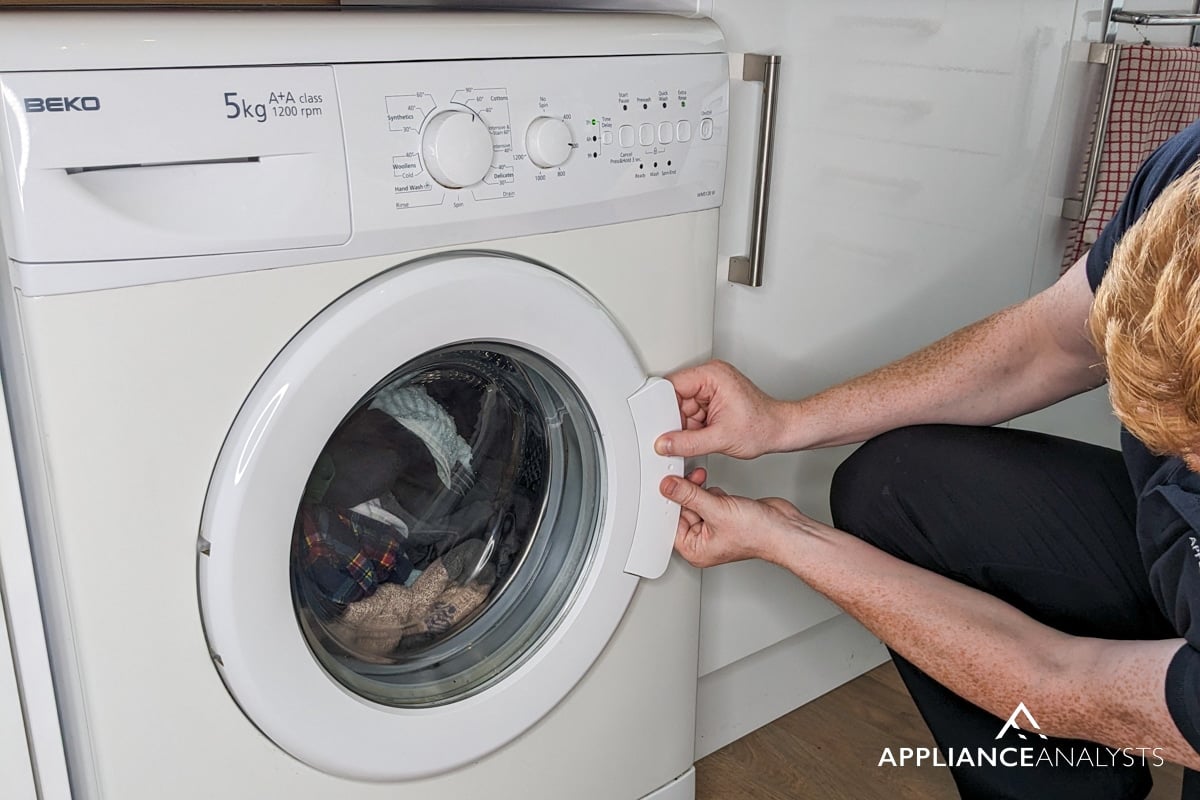We've independently reviewed this article to make sure it's as accurate as we can make it.
To find out more about our article creation and review process, check out our editorial guidelines.
If you’re like me, you’ve probably found yourself in a situation where your washer door has locked, and you can’t get it to open.
Maybe you dropped a sock into the machine or realized you had added too much detergent. Whatever the reason, you’re desperate to unlock the door and get your laundry back on track.
In this article, I’ll walk you through how to unlock any locked washer door. And the best part? You don’t need to be a whiz with tools or have a degree in appliance repair to get the job done.
We’ll look at some quick and easy ways to unlock your washer door, such as unplugging the machine, draining excess water, or even using the trusty old “bobby pin trick.” We’ll also talk about what could be causing the door to lock in the first place and how to avoid the problem in the future.
The tools you’ll need:
- A towel or container (to catch any water that comes out).
- A bobby pin, paperclip, or thin wire.
- A flashlight.
- A pair of pliers.
- A screwdriver.
Ready? Let’s dive in!
Why trust us? This article was written by Craig Anderson and James Blackford.
Craig has helped thousands of other homeowners repair their appliances since 2016.
James is one of our resident appliance experts with over 16 years of experience. He currently works as a Master Technician for SquareTrade, and runs his own appliance repair business.
#1 Wait for the Cycle to Complete
First things first, make sure the washer has finished its cycle. Many washers lock the door during the wash, rinse, and spin cycles to prevent accidents. However, if the washer is still running, the door will naturally unlock once the cycle is complete.
Give your washing machine a few minutes and listen for the click that signals the door has unlocked. Patience is a virtue, especially when it comes to appliance troubleshooting.
If the remaining time for the cycle is too long, you can turn the unit off and then back on. Next, select a drain and spin cycle, and if there’s an option for a “no spin” setting for the speed, choose it to shorten the cycle even further.
#2 Check the Power Supply
If your washing machine’s door is still locked after completing a cycle, my usual advice is to consider a power issue next. Sometimes, a power outage or a tripped circuit breaker can cause the washer to stop mid-cycle, leaving the door locked.
First, check your home’s electrical panel to see if any breakers have tripped. If so, reset the breakers and see if the door unlocks.
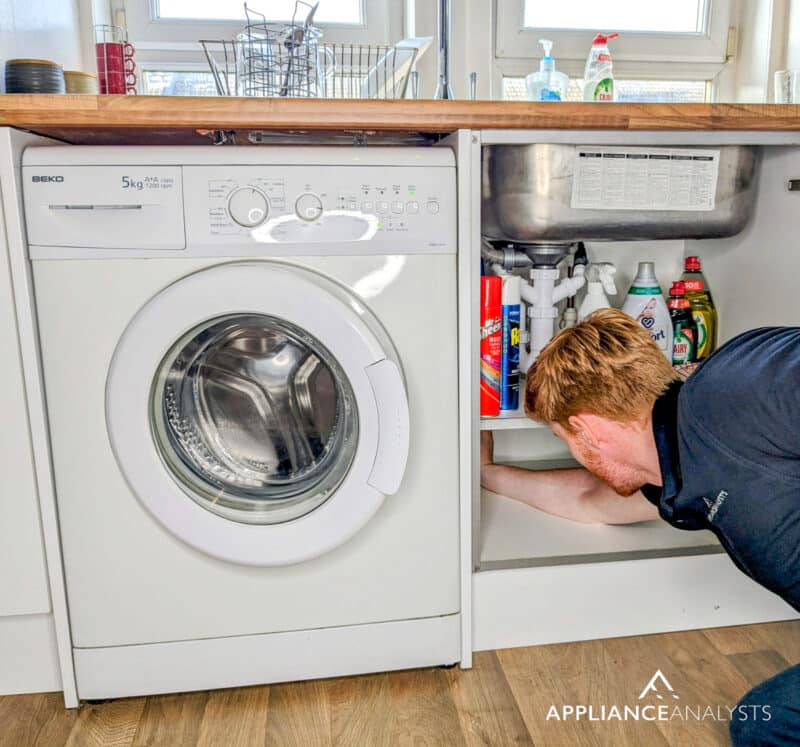
To check if there’s power going to your washer, you can access the plug the washer is using, unplug it, and then plug in a lamp. If the lamp turns on, you have power to the washer. If the lamp does not turn on, you may need to investigate further to find the source of the power issue.
#3 Drain Excess Water
Excess water or a bad drain pump could also explain why the washer door remains locked. Most washers have a safety feature that prevents the door from opening if there’s water in the drum to avoid flooding your laundry room.
However, especially with front-load washer types, there’s always the possibility that the wash cycle is over and there’s no excess water, yet the door will remain locked. From what I’ve seen, a bad pump could be to blame in such scenarios, so I suggest you try to drain it.
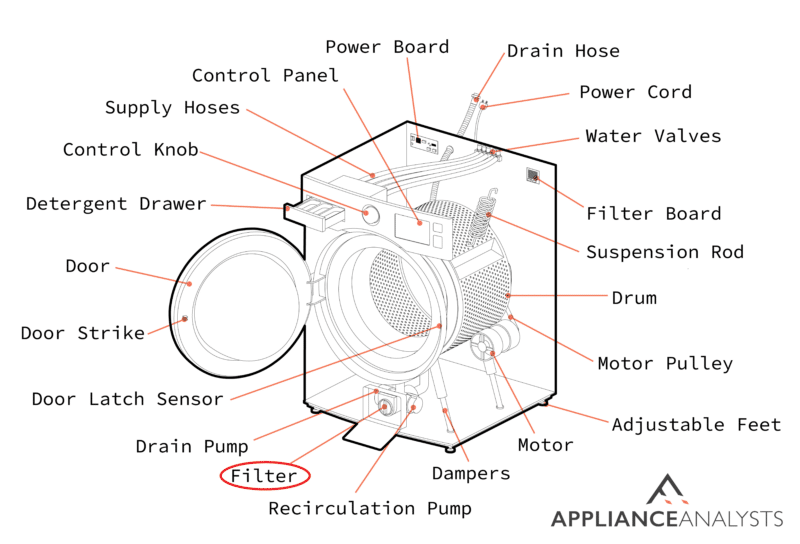
Here’s what you have to do:
- Locate the washer’s drain filter on your front-load washer, typically found behind a small access panel or door near the bottom of the unit.
- Place a towel or shallow container underneath the filter to catch any water.
- Slowly turn the filter counterclockwise to release the excess water. Make sure only to remove a small amount of water at a time to avoid making a mess.
- Once all the excess water has drained, close the filter and try opening the door again.
Pro Tip:
Most filters have a small flexible hose with a plastic cap; pull the hose out, remove the cap, and drain in the bucket before you remove the filter.
It’s common for that small drain line to be clogged; if no water comes out, just put the cap back on and slowly turn the drain filter until a small amount of water comes out. Repeat the process until the bucket is full.
Next, tighten the filter, empty the bucket, rinse, and repeat until the water is empty and stops flowing from the drain filter.
#4 Opening a Manual Lock
Manual locks are more straightforward to handle, consisting of a latch that fits into a release mechanism. If you need to open a manual lock in less than 5 minutes, there are several methods to try. If one way doesn’t work, move on to the next until the door opens.
Power Off the Machine
Turn the washer off by pressing the Power Off button to end the cycle. Unplug the power cable after the washer is powered off and wait 5 minutes. Then, check if the door opens. If not, please move on to the next step.
Wait for 5 Minutes
Most top-loading washers automatically unlock the door 5 to 6 minutes after powering off, as they sense the heat inside them decreases. As the washer cools off after 5 minutes, the door should unlock.
Gentle Slaps
If your washing machine door remains locked, gently slap the door handle (not the door itself). The goal is to loosen the door lock with gentle pressure and vibration. The slapping method works best with front loaders but is less effective with top loaders.
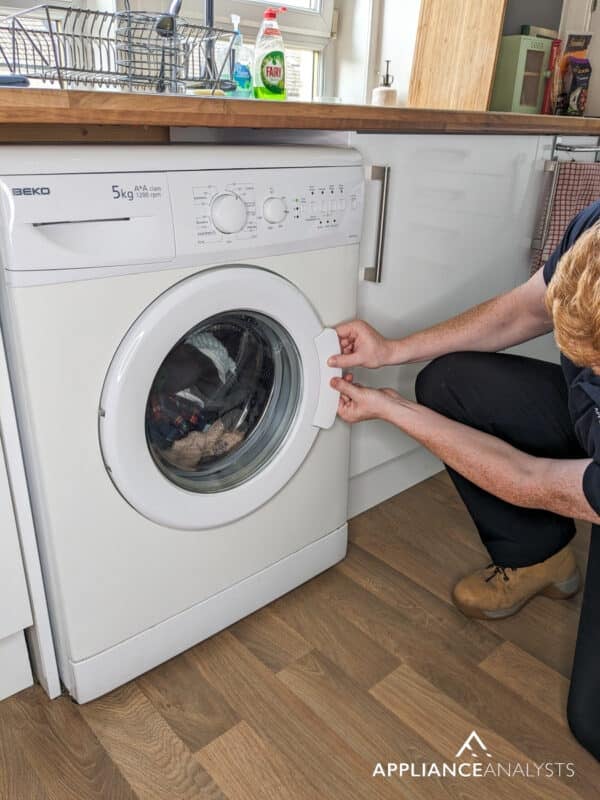
Nylon String Technique
Assuming your washing machine door remains locked, take a 20-inch piece of nylon string and slide one end between the door and the washer’s body, right under the lock. Continue feeding the string until the inside end comes out through the opposite seam of the door.
Tie both ends to create a loop, ensuring the string remains tight as it holds the lock’s latch. Finally, pull the string loop away from the lock to release the latch and open the door.
#5 Opening an Electronic Lock
If your washing machine door is still locked, it could be due to a failure in the electronic lock controlled by the machine’s computer. Here are various methods to deal with an electronic locking system, all of which can be done in less than 5 minutes.
Press Pause
Sometimes, the machine’s computer may not recognize that the cycle has ended due to faulty sensors. Press the Pause or Power Off button to inform the washer that the cycle is complete.
Unplug the Machine
Like older washer models, turning off the machine and unplugging it can solve the issue. My usual advice is to wait 5 to 10 minutes for the machine to cool down.
Use the Emergency Switch
Some washers have an emergency switch allowing you to open the electronic door manually.
To access the release switch, you’ll need to locate it on the door lock itself. First, remove the door boot spring and then peel back the door boot. Next, reach inside and feel for the release lever.
Once you find the release lever, pull the lever while simultaneously tugging at the washer door to open it.
#6 Door Safety Lock Issues
Damage to the door safety lock can keep your washing machine door locked, restricting access to the drum.
The safety lock keeps the door securely locked while the washer operates. You can try the above string method if the door safety lock is damaged.
Once the door is open, you can replace the damaged door safety lock.
Here’s how to replace the door lock:
- Turn off the washer and unplug the power cord from the outlet.
- Open the door completely to access the locking mechanism.
- Remove the door boot spring, peel back the door boot, and reach inside to feel for the release lever.
- Remove the two screws on the outside front panel of the washer, holding the door lock to the front panel.
- Gently slide your hand beneath the lock and ease it out, mindful of the cables connecting it to the washer.
- Detach the wires from the old lock and attach them to the new lock.
- Secure the new lock with screws, ensuring it’s properly aligned with the front panel.
Please note that there is no need for a seal around the door lock, as the lock and latch are not exposed to water.
#7 Stuck Washer Door
If your washing machine door is still locked, you can try releasing the lock inside it and replacing the lock mechanism, as the door strike mounted on the door may be the issue.
Luckily, replacing the door mechanism can be as simple as undoing a couple of screws. Here’s how to replace the washer door release mechanism:
- Locate the nuts or screws at the back of the washer door and remove them to detach the door from the machine.
- Examine the space between the outer and inner door trims, and find the screws holding them together.
- Remove the screws, separate the door trims, and remove the bowl to access the door release mechanism.
- Carefully remove the release mechanism from the door and replace it with a new one.
- Reassemble the bowl and trims, and tighten the screws.
- Reattach the door to the washer, and secure it with the nuts or screws.
#8 Defective Temperature Sensor
Under normal circumstances, your washing machine door remains locked if the drum’s temperature is too high to protect you from burns when handling hot laundry. The temperature sensor, or NTC sensor, is the component responsible for measuring the temperature inside the drum.
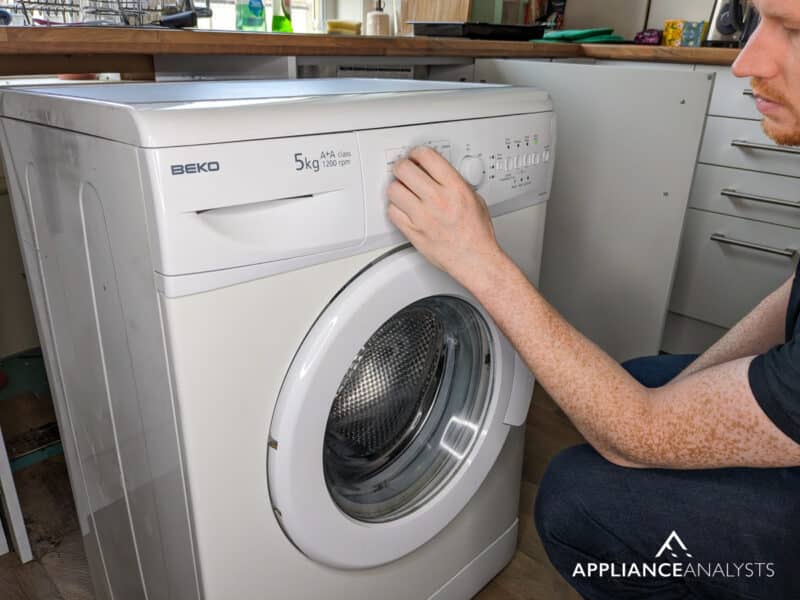
A faulty NTC sensor might send an incorrect high-temperature reading to the machine even when the drum is cool, preventing the door from opening. You can use a multimeter set to ohmmeter mode to determine if the NTC sensor is defective.
Find the sensor near the heating element and take a reading. The sensor is in good working condition if the reading falls between 20 to 30 Kiloohms. If not, it’s time to replace the NTC sensor. Follow your washer’s instructions when replacing the sensor to ensure safe and proper functioning.
Conclusion
Dealing with a locked washer door can be a frustrating experience, but it doesn’t have to be daunting. With the proper knowledge and patience, you can unlock your washer door in under 5 minutes and return to your laundry routine.
First, ensure the cycle is complete, check the power supply, perform a manual unlock, and troubleshoot potential issues. Remember that the most common reason a door won’t unlock is that water is not being drained.
With drainage issues, especially if your washer is near a door leading outside, you can quickly drain the washer by taking the drain hose from the wall, laying it outside the door, and allowing the water to flow out.
Draining your washing machine is a simple step that can save you the hassle of grabbing tools or turning screws.
If all else fails, don’t hesitate to call a professional for assistance. With these tips in your arsenal, you’ll be ready to tackle any locked washer door that comes your way. If this article was interesting and helpful, please consider checking out our other incredible resources below and subscribing to our newsletter.
Have a great week!
-Craig.
Frequently Asked Questions
How Much Does Replacing a Lid Lock Cost?
While there is some variation, the typical cost for replacing a lid lock is between $30-$80.
What Can I Do if My Washer Keeps Unlocking During a Cycle?
If you’re on the opposite side of this article’s problem, there’s nothing to worry about. Typically, when a washer keeps unlocking during a cycle, it’s due to a misaligned door strike, a broken door seal, faulty springs and hinges, and more.
Can I Buy Replacement Parts Myself?
Although it’s not forbidden to go shopping for parts yourself, you should bear in mind that many repair service companies WILL NOT install them due to liability reasons.
Most professionals prefer to buy the replacement parts themselves, as they know which ones are best and safest. Certain professionals are ok with working with parts supplied by homeowners, but typically, there isn’t a warranty on the labor in those cases.
